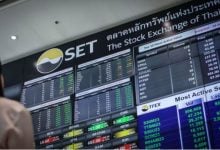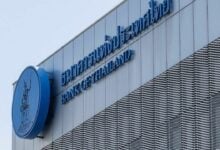Fed’s high interest rates outlook spooks Thai stock market investors

The hawkish stance of the Federal Reserve on maintaining “higher for longer” interest rates is projected to keep the Thai stock market in bearish territory. This comes as elevated rates pose a threat to global economic recovery, leading to consistent fund outflows from the Stock Exchange of Thailand (SET).
Despite the expected decision by the US central bank to retain the interest rate at 5.25 to 5.50%, Asian stock markets witnessed a downturn, mirroring Wall Street’s losses. The Fed’s indications of a possible interest rate hike this year, coupled with a longer-than-expected period of high rates to manage inflation, has led to unease among investors. The bank’s stated objective is to reach an inflation target of 2%.
Trading on the Thai stock market began on a low note but saw a marginal increase later in the day as the market fluctuated within a narrow range. Investors remain apprehensive about the impact of high global interest rates on economic recovery.
The Federal Open Market Committee‘s forecasts suggest two rate cuts next year, which is two less than its June forecast and slower than the market’s prediction of a rate cut beginning by mid-2024.
According to the Fed’s dot plot, there will be another increase in the interest rate to a median of 5.6% by the end of this year, followed by a drop to 5.1% in the next year. This is a significant increase from the June estimate of 4.6%. The Fed Watch Tool anticipates the regulator to hold the interest rate at 5.5% until mid-2024.
The US GDP estimate for this year has been increased by the Fed to 2.1%, a considerable upgrade from the 1% projected in June. It anticipates an expansion of 1.5% next year, followed by 1.8% each in 2025 and 2026.
Asia Plus Securities, in a research note, expressed concerns about the Fed’s potential long-term high-interest rate policy. It warned that such a stance could lead to a slowdown in economic activities and a surge in debt, with the US national debt already hitting a historical high of US$33 trillion.
As the US interest rate stabilises, the strength of the economy will be closely monitored. If it remains robust, the Fed may extend the period of high interest rates, leading to an increase in debt.
Nuttawut Wongyaowarak, a strategist at KTX Research, a part of Krungthai Xspring Securities, expressed concerns that the Fed’s revised projection for US economic growth could trigger a capital outflow from emerging Asian stock markets to the US. He cited weak exports, high oil prices, and a significant depreciation of the baht as contributing to the Thai stock market’s struggles.
He further speculated that the Thai GDP estimate could face a downgrade, while an amplified debt-to-GDP ratio could impact Thailand‘s credit rating in the next year.
“Funds may continue to flow out of the Thai bourse, and I think the SET index is likely to fall below the key resistance level of 1,500 points.”
Follow more of The Thaiger’s latest stories on our new Facebook page HERE.
Latest Thailand News
Follow The Thaiger on Google News:


























